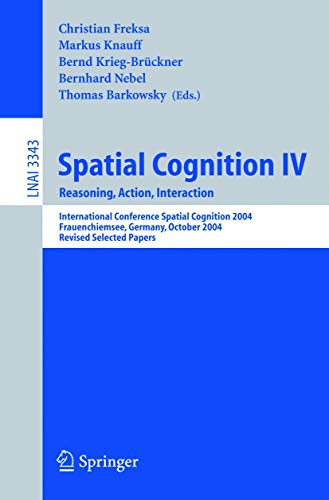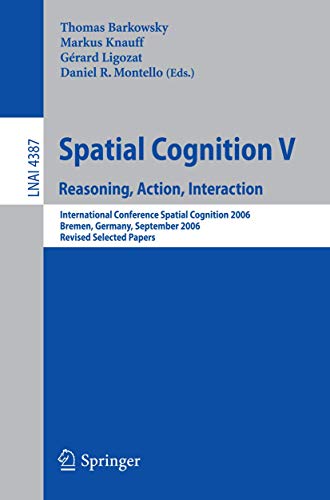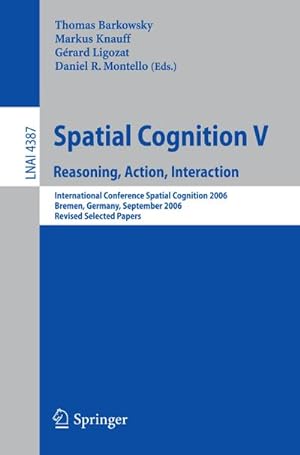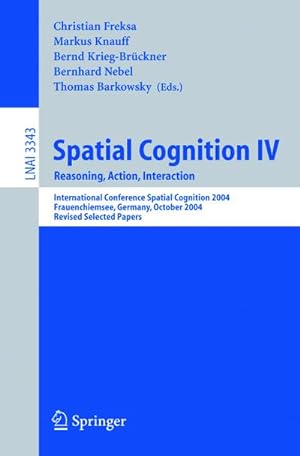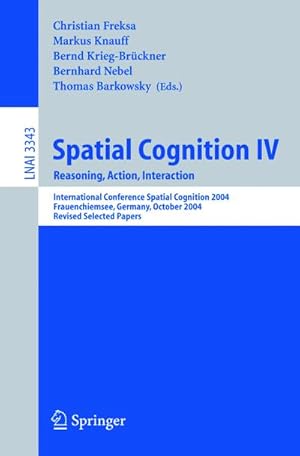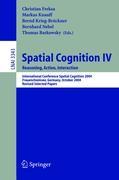Spatial Cognition Reasoning Action (16 results)
FeedbackSearch filters
Product Type
- All Product Types
- Books (16)
- Magazines & Periodicals (No further results match this refinement)
- Comics (No further results match this refinement)
- Sheet Music (No further results match this refinement)
- Art, Prints & Posters (No further results match this refinement)
- Photographs (No further results match this refinement)
- Maps (No further results match this refinement)
- Manuscripts & Paper Collectibles (No further results match this refinement)
Condition Learn more
- New (14)
- As New, Fine or Near Fine (1)
- Very Good or Good (1)
- Fair or Poor (No further results match this refinement)
- As Described (No further results match this refinement)
Binding
Collectible Attributes
- First Edition (No further results match this refinement)
- Signed (No further results match this refinement)
- Dust Jacket (No further results match this refinement)
- Seller-Supplied Images (5)
- Not Print on Demand (14)
Language (1)
Price
- Any Price
- Under US$ 25 (No further results match this refinement)
- US$ 25 to US$ 50
- Over US$ 50
Free Shipping
- Free Shipping to U.S.A. (No further results match this refinement)
Seller Location
Seller Rating
-
Spatial Cognition IV : Reasoning, Action, Interaction : International Conference on Spatial Cognition, Frauenchiemsee, Germany, October 11-13, 2004, Revised Selected Papers
Published by Springer- Verlag, New York City, 2005
ISBN 10: 3540250484 ISBN 13: 9783540250487
Language: English
Seller: Doss-Haus Books, Redondo Beach, CA, U.S.A.
Hardcover. Condition: Very Good. No Jacket. Hardcover 2005 library bound edition. Ex-library book with stamps and labels attached. Binding firm. Pages unmarked and clean. Laminated covers and text in very good to near fine condition. Series: Lecture Notes in Artificial Intelligence ;3343 .[xiii, 517 p. : ill. ; 24 cm].
-
Spatial Cognition V: Reasoning, Action, Interaction (Lecture Notes in Computer Science, 4387)
Seller: Best Price, Torrance, CA, U.S.A.
Condition: New. SUPER FAST SHIPPING.
-
Spatial Cognition V: Reasoning, Action, Interaction (Lecture Notes in Computer Science, 4387)
Seller: Lucky's Textbooks, Dallas, TX, U.S.A.
US$ 60.00
Convert currencyUS$ 3.99 shipping within U.S.A.Quantity: Over 20 available
Add to basketCondition: New.
-
Spatial Cognition IV, Reasoning, Action, Interaction: International Spatial Cognition 2004, Frauenchiemsee, Germany, October 11-13, 2004, Revised . (Lecture Notes in Computer Science, 3343)
Seller: GoldBooks, Denver, CO, U.S.A.
Condition: new.
-
Spatial Cognition V: Reasoning, Action, Interaction (Lecture Notes in Computer Science, 4387)
Seller: Ria Christie Collections, Uxbridge, United Kingdom
US$ 68.13
Convert currencyUS$ 16.13 shipping from United Kingdom to U.S.A.Quantity: Over 20 available
Add to basketCondition: New. In.
-
Spatial Cognition IV, Reasoning, Action, Interaction: International Spatial Cognition 2004, Frauenchiemsee, Germany, October 11-13, 2004, Revised ... (Lecture Notes in Computer Science, 3343)
Seller: Best Price, Torrance, CA, U.S.A.
Condition: New. SUPER FAST SHIPPING.
-
Spatial Cognition IV, Reasoning, Action, Interaction: International Spatial Cognition 2004, Frauenchiemsee, Germany, October 11-13, 2004, Revised ... (Lecture Notes in Computer Science, 3343)
Seller: Lucky's Textbooks, Dallas, TX, U.S.A.
US$ 117.41
Convert currencyUS$ 3.99 shipping within U.S.A.Quantity: Over 20 available
Add to basketCondition: New.
-
Spatial Cognition V: Reasoning, Action, Interaction : International Conference Spatial Cognition 2006 Bremen, Germany, September 24-28, 2006 Revised Selected Papers
Published by Springer-Verlag New York Inc, 2007
ISBN 10: 3540756655 ISBN 13: 9783540756651
Language: English
Seller: Revaluation Books, Exeter, United Kingdom
US$ 95.36
Convert currencyUS$ 33.66 shipping from United Kingdom to U.S.A.Quantity: 2 available
Add to basketPaperback. Condition: Brand New. 1st edition. 500 pages. 9.00x6.00x1.00 inches. In Stock.
-
Spatial Cognition V : Reasoning, Action, Interaction
Published by Springer Berlin Heidelberg, 2007
ISBN 10: 3540756655 ISBN 13: 9783540756651
Language: English
Seller: AHA-BUCH GmbH, Einbeck, Germany
US$ 64.71
Convert currencyUS$ 75.09 shipping from Germany to U.S.A.Quantity: 1 available
Add to basketTaschenbuch. Condition: Neu. Druck auf Anfrage Neuware - Printed after ordering - This is the fifth volume in a series of book publications featuring basic interdisciplinary research in spatial cognition. The study of spatial cognition is the study of knowledge about spatial properties of objects and events in the world. Spatial properties include location, size, distance, direction, separation and connection, shape, pattern, and so on. Cognition is about the structures and processes of knowledge: its acquisition, storage, retrieval, manipulation, and use by humans, nonhuman animals, and machines. Broadly construed, cognitive activities include sensation and perception, thinking, attention, imagery, attitudes, memory, learning, language, and reasoning and problem-solving; the interaction of these activities with motoric (body movement) and affective (emotional) processing is recognized as critically important, as well. Cognition is typically considered to make up much of the activity of the mind. But though the mind is an expression of the structures and processes of the brain and nervous system, it is also an expression of an organism or agent with a physical body that typically exists in a physical and socio-cultural world. Researchers study spatial cognition for several reasons. Spatial cognition plays important roles in most of the domains of knowledge and behavior of sentient beings, including activities associated with biological survival, social interaction, cultural practice, and economic exchange. Attempts to describe, predict, and explain the basic components of spatial cognition and their interrelationships stimulate a host of interesting basic questions about how important parts of reality work.
-
Spatial Cognition IV, Reasoning, Action, Interaction: International Spatial Cognition 2004, Frauenchiemsee, Germany, October 11-13, 2004, Revised ... (Lecture Notes in Computer Science, 3343)
Seller: Ria Christie Collections, Uxbridge, United Kingdom
US$ 135.39
Convert currencyUS$ 16.13 shipping from United Kingdom to U.S.A.Quantity: Over 20 available
Add to basketCondition: New. In.
-
Spatial Cognition V: Reasoning, Action, Interaction (Lecture Notes in Computer Science / Lecture Notes in Artificial Intelligence)
Seller: Mispah books, Redhill, SURRE, United Kingdom
US$ 152.56
Convert currencyUS$ 33.66 shipping from United Kingdom to U.S.A.Quantity: 1 available
Add to basketPaperback. Condition: Like New. Like New. book.
-
Spatial Cognition IV, Reasoning, Action, Interaction
Published by Springer Berlin Heidelberg, Springer Berlin Heidelberg Mär 2005, 2005
ISBN 10: 3540250484 ISBN 13: 9783540250487
Language: English
Seller: buchversandmimpf2000, Emtmannsberg, BAYE, Germany
US$ 129.44
Convert currencyUS$ 70.47 shipping from Germany to U.S.A.Quantity: 2 available
Add to basketTaschenbuch. Condition: Neu. Neuware -This is the fourth volume in a series of books dedicated to basic research in spatial cognition. Spatial cognition is a field that investigates the connection between the physical spatial world and the mental world. Philosophers and researchers have p- posed various views concerning the relation between the physical and the mental worlds: Plato considered pure concepts of thought as separate from their physical manifestations while Aristotle considered the physical and the mental realms as two aspects of the same substance. Descartes, a dualist, discussed the interaction between body and soul through an interface organ and thus introduced a functional view that presented a challenge for the natural sciences and the humanities. In modern psych- ogy, the relation between the physical and the cognitive space has been investigated using thorough experiments, and in artificial intelligence we have seen views as diverse as ¿problems can be solved on a representation of the world¿ and ¿a representation of the world is not necessary. ¿ Today¿s spatial cognition work establishes a correspondence between the mental and the physical worlds by studying and exploiting their interaction; it investigates how mental space and spatial ¿reality¿ join together in understanding the world and in interacting with it. The physical and representational aspects are equally important in this work. Almost all topics of cognitive science manifest themselves in spatial cognition. 540 pp. Englisch.
-
Spatial Cognition IV, Reasoning, Action, Interaction : International Spatial Cognition 2004, Frauenchiemsee, Germany, October 11-13, 2004, Revised Selected Papers
Published by Springer Berlin Heidelberg, 2005
ISBN 10: 3540250484 ISBN 13: 9783540250487
Language: English
Seller: AHA-BUCH GmbH, Einbeck, Germany
US$ 129.44
Convert currencyUS$ 75.23 shipping from Germany to U.S.A.Quantity: 1 available
Add to basketTaschenbuch. Condition: Neu. Druck auf Anfrage Neuware - Printed after ordering - This is the fourth volume in a series of books dedicated to basic research in spatial cognition. Spatial cognition is a field that investigates the connection between the physical spatial world and the mental world. Philosophers and researchers have p- posed various views concerning the relation between the physical and the mental worlds: Plato considered pure concepts of thought as separate from their physical manifestations while Aristotle considered the physical and the mental realms as two aspects of the same substance. Descartes, a dualist, discussed the interaction between body and soul through an interface organ and thus introduced a functional view that presented a challenge for the natural sciences and the humanities. In modern psych- ogy, the relation between the physical and the cognitive space has been investigated using thorough experiments, and in artificial intelligence we have seen views as diverse as 'problems can be solved on a representation of the world' and 'a representation of the world is not necessary. ' Today's spatial cognition work establishes a correspondence between the mental and the physical worlds by studying and exploiting their interaction; it investigates how mental space and spatial 'reality' join together in understanding the world and in interacting with it. The physical and representational aspects are equally important in this work. Almost all topics of cognitive science manifest themselves in spatial cognition.
-
Spatial Cognition IV, Reasoning, Action, Interaction: International Spatial Cognition 2004, Frauenchiemsee, Germany, October 11-13, 2004, Revised . (Lecture Notes in Computer Science, 3343)
Seller: GoldBooks, Denver, CO, U.S.A.
Paperback. Condition: new. New Copy. Customer Service Guaranteed.
-
Spatial Cognition IV, Reasoning, Action, Interaction
Published by Springer Berlin Heidelberg Mrz 2005, 2005
ISBN 10: 3540250484 ISBN 13: 9783540250487
Language: English
Seller: BuchWeltWeit Ludwig Meier e.K., Bergisch Gladbach, Germany
US$ 129.44
Convert currencyUS$ 27.02 shipping from Germany to U.S.A.Quantity: 2 available
Add to basketTaschenbuch. Condition: Neu. This item is printed on demand - it takes 3-4 days longer - Neuware -This is the fourth volume in a series of books dedicated to basic research in spatial cognition. Spatial cognition is a field that investigates the connection between the physical spatial world and the mental world. Philosophers and researchers have p- posed various views concerning the relation between the physical and the mental worlds: Plato considered pure concepts of thought as separate from their physical manifestations while Aristotle considered the physical and the mental realms as two aspects of the same substance. Descartes, a dualist, discussed the interaction between body and soul through an interface organ and thus introduced a functional view that presented a challenge for the natural sciences and the humanities. In modern psych- ogy, the relation between the physical and the cognitive space has been investigated using thorough experiments, and in artificial intelligence we have seen views as diverse as 'problems can be solved on a representation of the world' and 'a representation of the world is not necessary. ' Today's spatial cognition work establishes a correspondence between the mental and the physical worlds by studying and exploiting their interaction; it investigates how mental space and spatial 'reality' join together in understanding the world and in interacting with it. The physical and representational aspects are equally important in this work. Almost all topics of cognitive science manifest themselves in spatial cognition. 540 pp. Englisch.
-
Spatial Cognition IV, Reasoning, Action, Interaction
Published by Springer Berlin Heidelberg, 2005
ISBN 10: 3540250484 ISBN 13: 9783540250487
Language: English
Seller: moluna, Greven, Germany
US$ 111.63
Convert currencyUS$ 57.54 shipping from Germany to U.S.A.Quantity: Over 20 available
Add to basketCondition: New. Dieser Artikel ist ein Print on Demand Artikel und wird nach Ihrer Bestellung fuer Sie gedruckt. This is the fourth volume in a series of books dedicated to basic research in spatial cognition. Spatial cognition is a field that investigates the connection between the physical spatial world and the mental world. Philosophers and researchers have p- pose.


